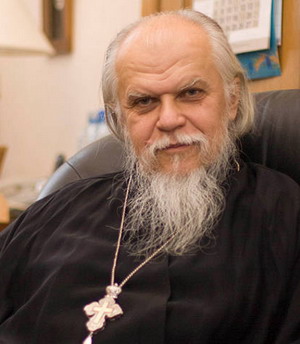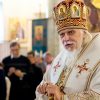Bishop Panteleimon of Smolensk and Vyazma answers the question: How do we know God’s Will?
 That is a very good question.
That is a very good question.
God’s Will is what God wants to reveal to us. It seems to us that His Will is a sort of mystery, sealed seven times over, and that although we struggle to know it, somehow God wants to hide it from us.
In reality, God’s will is what God wants to reveal to us and what He does reveal to us. It is not what we live, but a sort of Divine will which is a mystery and a secret, which we strive and struggle to know. Though, in one sense, perhaps God does want us to solve a difficult problem, to make efforts. Nevertheless God’s will is what is revealed to us easily. And it becomes inaccessible to us only because we turn away from it.
The main condition required to know God’s will is to renounce our own will. This is what obedience means. This is why a child must obey its parents – he must learn to renounce his own will, no matter what his parents are like, whether they are devout, not devout, intelligent or stupid. Why does a wife have to obey her husband, no matter what? Sometimes I ask women this when they come to confession. An elderly woman comes along and I ask: ‘How are you, do you obey your husband?’ ‘Me, I’m not going to start obeying that old fool’. But whoever he is – he is still your husband.
When you learn to obey someone – a teacher, a husband, a parent, a spiritual father – you are renouncing your own will.
Many novices used to go off to very strict spiritual fathers. And the strictness of their spiritual fathers quenched their thirst for suffering, their thirst for obedience, their thirst to witness before God to their readiness to suffer even unto blood and to renounce their will.
In other words, in order to start to know God’s will we must know how to renounce our own will. If we do not know how to renounce our own will, if we still keep to it, then nothing can help us. On the contrary, God will hide His will from us. Because if we know His will, we will oppose it. As a loving father He does not want us to undergo a greater punishment for what we knew but did not do. It is better that He hides it from us so that we do not know it, so that we will be punished less.
If we renounce our own will, then God’s will is revealed to us more often. Even a child can proclaim God’s Will. He can know God’s will from reading the Gospel and from the words of his spiritual father. And what is probably the most important thing here is of course those special elders, special saints, to whom God’s will is revealed, perfectly clearly.

Fr Paul Troitsky
Fr Paul Troitsky was just such an elder. Perhaps we just say something about him. When he was alive, we used to get letters from him where he wrote quite clearly: This is God’s will. Do this and do that. This marriage is not God’s will. And we knew it really was so. And if you did something else, then all sorts of misfortunes and disasters would befall you. It was very easy to know God’s will in this way. But it was also terrible. Because God’s will may very well be the opposite of our own will.
However, Fr Paul did not always reveal God’s will to those who came to him. At the Convent of the Conception in Moscow there is Abbess Juliana. Once she was Masha and worked as a nurse in a children’s reanimation department. And she decided to get married. Her spiritual father blessed her, her parents blessed her, but she did not ask Fr Paul if this was God’s will. She wrote him a letter where she told him what was happening and he wrote back to her: I will pray for you, only do not tell your future husband anything about me. He did not tell her that the marriage was God’s will. She did not ask him and he did not say anything. Because God’s will is revealed to those who seek to know it.
But this Masha was troubled. She was troubled and did not know what to do. And she wrote another two letters to Fr Paul, even though it was wrong to ask the same thing twice. She wrote to him with the question – is this God’s will? Fr Paul replied that he had prayed to God for a long time, that he asked forgiveness of her, of her parents, of her spiritual father, that he understood that he was greatly upsetting them, but that this marriage was not God’s will.
After that she rejected her fiancé. And after that she began asking Fr Paul what she was to do; could she meet young people, could she think about marriage? And he wrote to her: do not seek to meet anyone, but if someone wants to meet you, then we will talk about it. Finally, she asked him if it was God’s will for her to get married at all. And he answered her that it was not.
Why? Because she had to be the Abbess of the Convent of the Conception. But this was not revealed straightaway.
And God does not reveal things to us straightaway – this is not exactly God’s will is a very general concept, our destiny, our future is not revealed to us straightaway. If one of you received a revelation about what you will have to endure in life, you would probably get depressed or perhaps worse. So these things are revealed to us only gradually.
And generally speaking, just as an apple is eaten in mouthfuls, so we only gradually adapt to spiritual life. But when there is such an elder, then of course it is possible to know what God’s will is. When there is no such elder, then the Gospel or a spiritual father helps us to know what it is.
This is why we say that it would be good to have a spiritual father. When I served in Moscow, I used to speak to our sisters who studied at the college and they knew the answer to every difficult question. They asked: ‘What should we do if there is this or that? What should we do if this or that happens?’ They always knew the answer was, ‘You must ask your spiritual father’.
But here now, in Smolensk, there are few spiritual fathers and I cannot tell you what you must ask your spiritual father. Recently I have begun to have doubts about this. The priest you confess with may not be a spiritual father or a spiritual person, but any priest you confess with will answer your question. So, friends, I do not advise you to answer in this way.
God’s will is known from what is done. For instance, if we begin to do something and it gets done, then we think that that is God’s will. If it does not happen, then we believe that it is not God’s will.
But of course sometimes at first you think that something is not God’s will and then you start to think that actually it is. And then you change your opinion again. And so you change your opinion about it lots of times. Inasmuch as we are not spiritual people but changeable, the decision as to whether something is God’s will or not depends on our mood.
One thing is for sure, that we need to learn in order to know God’s will.
Fr Paul used to write letters to Fr Vsevolod Shpiller. And in these letters he very often wrote that one thing was God’s will and another not. And Fr Vsevolod’s son would read these letters. Yan Vsevolodovich Shpiller was a conductor. And once he found a book called the ‘Heliotropion’ and decide to read it and so learn to know God’s will.
But Fr Paul wrote to him that you cannot know God’s will from books, and God’s will is all the more not revealed to young people.
We can be sure of one thing, dear friends, and that is that we must strive to know God’s will. How can we know it? If we have something to do and we do not know whether to do it or not, first of all we have to renounce our own will, so that both choices are completely equal in significance. In order to resolve whether we are to live or to die, to be ill or to get better, to marry or not to marry, or some other issue, we have to stand aside, we must not be partial to any decision.
And once we have done this, we must pray to God ardently so that the Lord reveals His will, so that the Lord brings us understanding. And where our heart inclines, that is what we must do.
I am not sure that we always do God’s will. But nevertheless in this renunciation of our own will, in praying to God, in recalling the words of the Gospel, there comes a certain experience, a certain ability to distinguish between what is good and what is bad. But this does not come straightaway – we have a certain distance to go.
In order to know God’s will, we probably have to live a long life, we have to learn how to give up own will, to learn how to pray. Then God’s will is revealed.
But of course if we want to learn how to do God’s will, it is also very important to do what we already know is God’s will.
Is it God’s will to pray in the mornings? And what if we never do this? Is it God’s will for us never to get angry? But we often get angry. Is it God’s will for us to fast? We must not break the fast. Is it God’s will for us not to sit in front of the internet till the middle of the night? Clearly, this is God’s will.
If we do what we already know to be God’s will, then the Lord will of course reveal God’s will to us in other situations as well. But if we do not do what is already known to us – then what sort of God’s will is this?
I will end these long-drawn out reflections about God’s will by telling you about an interesting thing that happened to us on Mt Athos. I was walking with Fr Vladimir Vorobiov and Fr Antony Frolov from the monastery of Zographou to the monastery of Hilandari.
We asked the way, went the wrong way, but boldly went on thinking that we were going the right way. We met a man dressed in lay clothes. He was a Bulgarian priest – a lot of them come to the monastery to do some work there. He asked us where we were going and we said to Hilandari. He said we were going the wrong way, we would not get there in time, the gates would be closed and we would have to spend the night on the road. We had to go back.
But we were quite certain that we were going the right way because we had been told so, and we began to say he was wrong, that we were going the right way and we began to argue with him. But he started to help us and ask us: But how can that be so? What are you relying on? And one of us said ‘We rely on God’s will’. To this he answered: ‘What is God’s will to fools?’ Fools, that is, in the sense of people who are not humble. Of course, there are different types of fools. A humble fool is better than any clever but proud person.
Therefore, of course, if we want to know God’s will, we have to exert our mind, acquire humility and learn how to renounce our own will. Then, of course, God’s will is definitely revealed to us.
Translated from Russian by Fr. Andrew Phillips
Source: Ekaterina Stepanova: Neskuchny Sad journal.



















